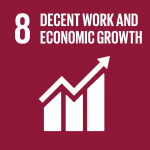“Decent work in safe and stable conditions is a vital component of helping people out of poverty, with the related aspects of reducing hunger and increasing health. The rise of precarious employment, modern slavery, and uneven growth has created threats to a sustainable future. Universities as employers can lead the way, as teachers can educate for the future, and as innovators can develop new and fairer ways of working.”
(THE Impact Rankings)
SDG 8: DECENT WORK AND ECONOMIC GROWTH
Employment Practice
- Employment Practice Living Wage
- Employment Practice Unions
- Employment Policy on Discrimination
- Employment Policy Modern Slavery
- Employment Practice Equivalent Rights Outsourcing
- Employment Policy Pay Scale Equity
- Tracking Pay Scale for Gender Equity
- Employment Practice Appeal Process
- Employment Practice Labour Rights
ITS Living Wage Policy & Initiative to Guarantee Employee Financial Stability
Institut Teknologi Sepuluh Nopember (ITS) is committed to fair compensation for its staff and faculty. To ensure this commitment, ITS adheres to Minimum City Wage (UMK) of Surabaya, as stated in Decree of the Governor of East Java Number 188, 2023, page 5, guaranteeing a minimum wage of IDR 4.725.479 (Four million seven hundred twenty-five thousand four hundred seventy-nine).
One practice to ensures that all employees, including candidates for positions or on the job training, receive a minimum monthly income that meets or exceeds the living wage standard aforementioned, ITS affirm the Regulation of ITS Rector Number 8, 2020 as follows
Candidates for ITS employees are all candidates for Civil Servants/non-Civil Servants before being appointed as Civil Servants/non-Civil Servants, who must undergo a probation period of up to one (1) year, receiving 80% (eighty percent) of the basic salary (Chapter I, Article 1, Clause 2 )
The Minimum City Wage, hereinafter referred to as UMK, is the minimum wage applicable in the city of Surabaya (Chapter I, Article 1, Clause 3 ).
The supplemental income adjustment for the minimum city wage, hereinafter referred to as TPPUMK, is the monthly additional income paid to candidates for employment at ITS whose earnings are still below the minimum city wage (Chapter I, Article 1, Clause 4)
ITS also ensures the employment practice living wage with the remuneration system to make up for the gap between the employee basic salary and the minimum wage in Surabaya. This system include additional payment based solely on position and work duration, stated on Regulation of ITS Rector Number 25, 2021, stipulates in Article 24, Clauses 1-4 such as:
(1) Salaries and personal allowances
- monthly salary;
- 13th salary;
- monthly additional income;
- additional income for the 13th month;
- additional study assignment allowance; and
- additional study assignment allowance for the 13th month.
(2) Position allowances
- structural position allowance;
- academic position allowance;
- general functional position allowance;
- specific functional position allowance;
- professional allowance;
- honorary professor allowance;
- honorary rector allowance; and
- honorary vice rector allowance.
(3) Performance incentives
- individual performance incentives;
- structural position performance incentives;
- 13th individual performance incentive; and
- 13th structural position performance incentive.
(4) Other allowances
- meal allowance;
- food allowance;
- family allowance;
- overtime pay;
- holiday allowance;
- old age allowance;
- pension benefits;
- health insurance;
- accident insurance;
- death insurance; and
- gratuity.
Pay for Person guarantees that each employee receives a baseline salary that meets or exceeds the living wage standard. Employees are also compensated based on their job roles and responsibilities from the pay for position. This ensures that higher-level positions receive appropriate compensation that reflects their contribution to the institution, further supporting financial stability for employees in these roles. While the performance-based pay component rewards employees for their contributions and achievements, additional Workers’ Welfares supports employees further by providing various welfare benefits which contributes to overall financial security, helps to offset daily living costs, ensuring employees have access to adequate nutrition, and ITS supports long-term financial security for employees, encouraging them to plan for their future. This system is also evident in myITSpayroll application, where the food allowance and monthly additional income (TPB) are tracked in the system image below.
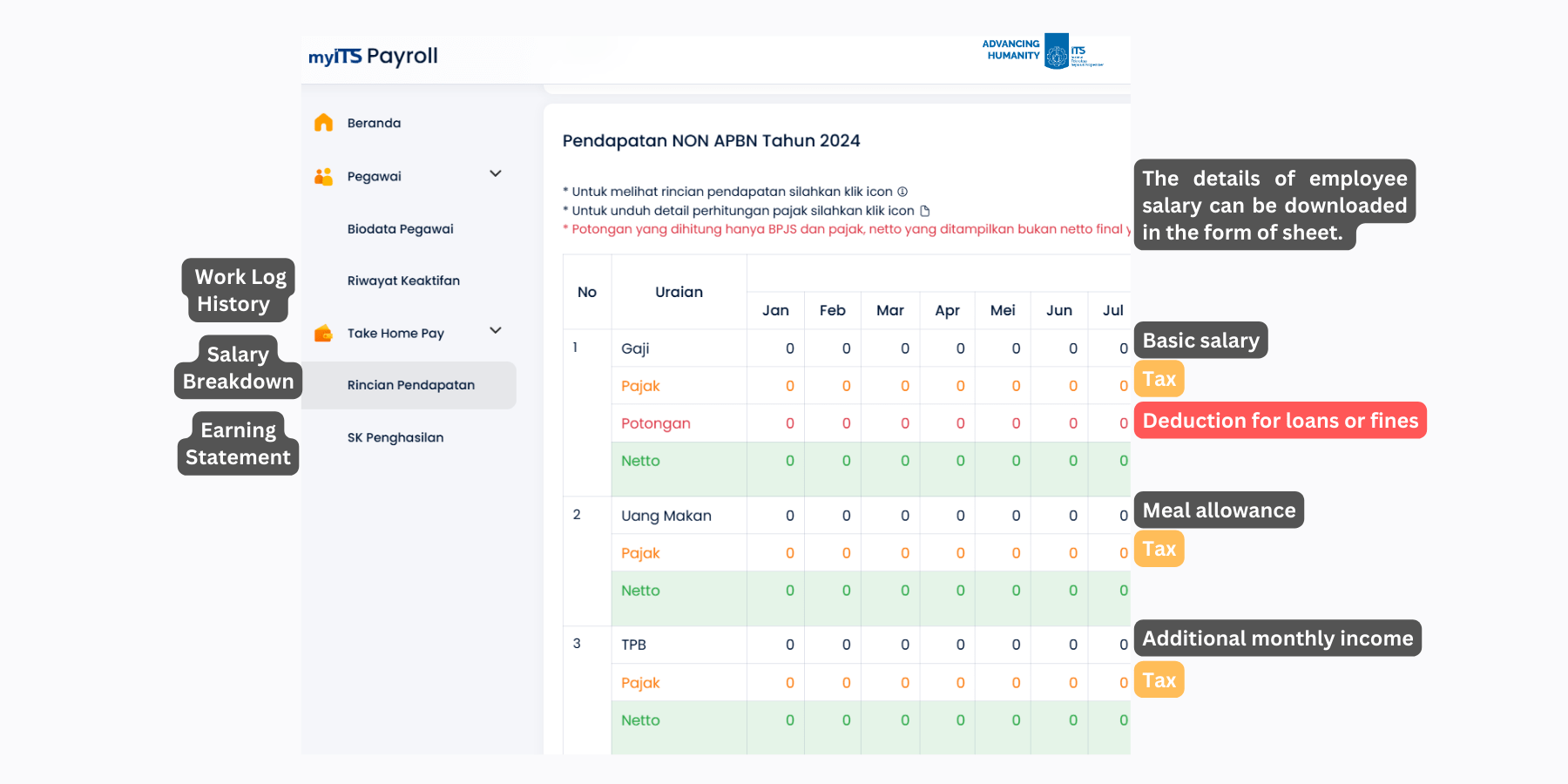
ITS Worker Union Activities through Koperasi Pegawai Republik Indonesia (KPRI)-ITS
Institut Teknologi Sepuluh Nopember (ITS) is committed to upholding the labor rights of all its employees, including the fundamental freedoms of association, assembly, expression, and collective bargaining through its cooperative (koperasi). Koperasi comes from the word “Co-Operative,” which literally means working together. A cooperative is an autonomous association of individuals or employee who voluntarily come together to fulfill their shared economic, social, and cultural needs and aspirations through a jointly-owned and democratically-controlled enterprise. The purpose of a cooperative business is to meet the needs of its members or to serve its members. Cooperatives embody economic democracy through principles of solidarity, mutual support, transparency, accountability, and democratic participation. KPRI-ITS is an employee organization founded on September 17, 1981, and legally constituted under Entity Number 5089/BH/11/81, aims to:
- Increasing the knowledge of management and members through cooperative education, financial investment, and entrepreneurship.
- Developing new and sustainable businesses in the real sector to improve the welfare of members.
- Empowering the economic capacity of members by connecting/promoting member-owned businesses, including providing business capital loans.
- Utilizing continuous technological developments in the cooperative’s operational and service businesses.
- Providing optimal financial solutions for members, in the form of savings, loans, financing, and capital.
- Contributing to the social and economic development of the ITS community.
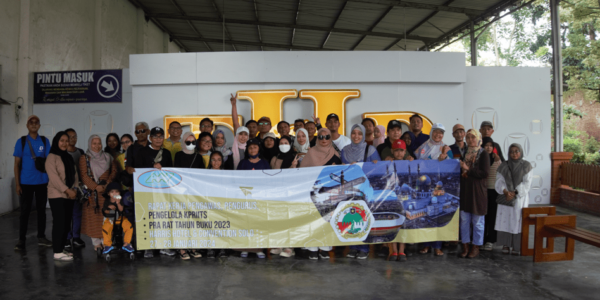
KPRI-ITS’ membership is based on equality and unity, therefore it is open to all ITS employees, and it respects the principles of economic democracy and cooperatives. The presence of women staff inside KPRI-ITS implies that there is no gender gap. International staff can also join KPRI-ITS because in membership registration can submit proof of employment without international documents. KPRI-ITS implements various services, such as savings and loans for ITS employees, as well as outstanding programs, such as the established K-1 Mart, e-store services, and business with partners, to promote welfare and satisfy the demands of ITS workers.
In 2023, KPRI ITS opened recruitment for candidates of KPRI ITS Chairman 2024-2026 period. Based on the KPRI ITS Circular Letter 2023, the criteria for members of the cooperative to apply for the position of cooperative chairperson are as follows:
- Must have been a member of KPRI-ITS for at least 3 years and/or have previously served as a member of the Supervisory Body of the Cooperative (BPK), the Working Body of the Member Meeting (BPRA), or as an administrator.
- The candidate must be a permanent employee of ITS (both civil servants and non-civil servants).
- Must have a commitment to advance KPRI-ITS.
- Must sign an Integrity Pact.
- Must fill out and submit a willingness form to become a candidate for chairperson.
- Must submit a vision, mission, and work program for the next 3 years.
- Must be a maximum of 55 years old at the time of application.
- The candidate for KPRI-ITS chairperson must not be a member of the 2023 Formation Team.
The criteria promote equal opportunities for all members, regardless of gender, fostering an inclusive environment. By emphasizing the importance of commitment to the cooperative’s mission, these criteria align with the goal of advancing sustainable economic growth and decent work for all, as outlined in SDG 8. This approach creates a culture where all employees, including women and marginalized groups, feel empowered to contribute to the organization’s success. Furthermore, by allowing members from diverse backgrounds—especially those with experience in supervisory roles—to apply for leadership positions, the criteria cultivate a rich pool of diverse leaders.
Board of Trustee (Majelis Wali Amanat-MWA) ITS Membership
Board of Trustee is an ITS institution responsible for the tasks of establishing, providing input on the execution of overarching policies, and conducting oversight in areas outside of academics. Membership in MWA is accessible to all members of the academic community, such as lecturers, staff, and students. The criteria for MWA members do not specify any particular gender, reflecting a commitment to gender equality in MWA membership.

ITS MWA took a significant step toward supporting labour rights in higher education by participating in the Working Meeting of various universities’ MWA, or better known as PTNBH MWA Forum, held from May 29 to May 31, 2023. This gathering, involving the Board of Trustees (Majelis Wali Amanat, or MWA) from 21 autonomous universities in Indonesia (Perguruan Tinggi Negeri Berbadan Hukum, PTNBH), set a collaborative tone for furthering progress in Indonesian higher education, particularly in labour rights and institutional governance. The event discussed the developments within the 21 MWAs, highlighting their achievements, ongoing challenges, and proposed activities.
Declaration Against Slavery And Discrimination in
Institut Teknologi Sepuluh Nopember (ITS)
At Institut Teknologi Sepuluh Nopember (ITS), we believe that every person is valued and respected. The following Institut Teknologi Sepuluh Nopember Declaration Against Slavery and Discrimination in every employment practice, singed by ITS Rector and translated into English, outlines our comprehensive policy to uphold these principles and create a more equitable and just society.
Preamble
ITS is hereby declaring our commitment to reject all forms of slavery and discrimination against women and men (gender) in every employment practice at ITS. We believe that every individual, regardless of gender, age, ethnicity, religion, or social status, has the right to freedom and fair treatment.
Policy Statements
1. Recognition of Human Rights
We acknowledge that all human beings are born free and equal in dignity. Any form of slavery, whether traditional or modern, is an intolerable violation of human rights.
2. Rejection of Slavery and Exploitation
We reject all forms of slavery, including human trafficking, forced labor, child labor, and sexual exploitation. Every individual has the right to live in freedom and without threat to their personal integrity.
3. Gender Equality
We affirm that discrimination based on gender is a form of injustice that must be eradicated. All women and men are entitled to equal opportunities in all aspects of life, including education, employment, position, and participation in decision-making.
4. Protection and Support for Victims of Slavery and Discrimination
We are committed to providing protection and support to victims of slavery and discrimination based on gender, age, ethnicity, religion, or social status. We will work to provide rehabilitation services, education, and access to justice for those affected.
5. Education and Awareness of the Dangers of Slavery and Discrimination
We will raise public awareness of the dangers of slavery and discrimination based on gender, age, ethnicity, religion, or social status through education, public campaigns, community programs, and obtaining education and equal rights, but we do not give space to LGBTQ declarations.
6. Shared Responsibility in Eradicating Slavery and Discrimination
We invite all elements of society, including government, non-governmental organizations, and the private sector, to unite in combating slavery and discrimination based on gender, age, ethnicity, religion, or social status. Collective action is needed to create a world free from injustice.
Conclusion
ITS is committed to striving for freedom, equality, and justice for all individuals, and to eradicating all forms of slavery and discrimination based on gender, age, ethnicity, religion, or social status in every working environment at ITS.
Declaration Against Slavery And Discrimination in
Institut Teknologi Sepuluh Nopember (ITS)
At Institut Teknologi Sepuluh Nopember (ITS), we believe that every person is valued and respected. The following Institut Teknologi Sepuluh Nopember Declaration Against Slavery and Discrimination in every employment practice, singed by ITS Rector and translated into English, outlines our comprehensive policy to uphold these principles and create a more equitable and just society.
Preamble
ITS is hereby declaring our commitment to reject all forms of slavery and discrimination against women and men (gender) in every employment practice at ITS. We believe that every individual, regardless of gender, age, ethnicity, religion, or social status, has the right to freedom and fair treatment.
Policy Statements
1. Recognition of Human Rights
We acknowledge that all human beings are born free and equal in dignity. Any form of slavery, whether traditional or modern, is an intolerable violation of human rights.
2. Rejection of Slavery and Exploitation
We reject all forms of slavery, including human trafficking, forced labor, child labor, and sexual exploitation. Every individual has the right to live in freedom and without threat to their personal integrity.
3. Gender Equality
We affirm that discrimination based on gender is a form of injustice that must be eradicated. All women and men are entitled to equal opportunities in all aspects of life, including education, employment, position, and participation in decision-making.
4. Protection and Support for Victims of Slavery and Discrimination
We are committed to providing protection and support to victims of slavery and discrimination based on gender, age, ethnicity, religion, or social status. We will work to provide rehabilitation services, education, and access to justice for those affected.
5. Education and Awareness of the Dangers of Slavery and Discrimination
We will raise public awareness of the dangers of slavery and discrimination based on gender, age, ethnicity, religion, or social status through education, public campaigns, community programs, and obtaining education and equal rights, but we do not give space to LGBTQ declarations.
6. Shared Responsibility in Eradicating Slavery and Discrimination
We invite all elements of society, including government, non-governmental organizations, and the private sector, to unite in combating slavery and discrimination based on gender, age, ethnicity, religion, or social status. Collective action is needed to create a world free from injustice.
Conclusion
ITS is committed to striving for freedom, equality, and justice for all individuals, and to eradicating all forms of slavery and discrimination based on gender, age, ethnicity, religion, or social status in every working environment at ITS.
ITS Prioritizes Fair and Equitable Rights for Outsourced Workers
Institut Teknologi Sepuluh Nopember (ITS) is committed to ethical and responsible employment and business practices, including the fair treatment of all individuals, regardless of employment status. ITS Anti-Slavery and Discrimination Declaration and Regulation of ITS Rector Number 1, Year 2022 Regarding Procurement of Goods and services are key instruments in ensuring that ITS and its supply chain adhere to ethical principles and human rights standards. It also ensures that their treatment, protections, and opportunities mirror those of directly employed staff. ITS Anti-Slavery and Discrimination Declaration in the workplace, ratified by ITS Rector ensures the following points:
Rejection of Slavery and Exploitation (in every employment practice). We reject all forms of slavery, including human trafficking, forced labor, child labor, and sexual exploitation. Every individual has the right to live in freedom and without threat to their personal integrity. (Point 2)
Gender Equality. We affirm that discrimination based on gender is a form of injustice that must be eradicated. All women and men are entitled to equal opportunities in all aspects of life, including education, employment, position, and participation in decision-making. (Point 3)
Protection and Support for Victims of Slavery and Discrimination. We are committed to providing protection and support to victims of slavery and discrimination based on gender, age, ethnicity, religion, or social status. We will work to provide rehabilitation services, education, and access to justice for those affected. (Point 4)
In alignment with the principles of transparency, accountability, and fairness in the procurement of goods and services, ITS also outlines the relevant provisions set forth in the Regulation of ITS Rector Number 1, Year 2022 about outsourced employees, which fall into other service categories. The policy further explains:
The Goods/Services Provider, hereinafter referred to as the Provider, is a business entity, individual, or ITS-affiliated business entity whose business activities involve the provision of Goods/Services. (Chapter 1, Article 1, Clause 21)
Other Services refer to services that require specific equipment, methodologies, and/or skills within a widely recognized business management system to complete a task or any provision of services other than Consultancy Services.” (Chapter 1, Article 1, Clause 27)
To ensure fairness in the procurement process and prevent discrimination, fostering equity and discouraging exploitation. ITS outlines several prohibitions:
When packing Goods/Services, the following is prohibited:
(a) Combining several procurement pack that, based on their nature and type of work, can be separated and/or whose value should be handled by Micro and Small Enterprises; (b) Splitting the procurement of Goods/Services into several packages with the intention of avoiding E-tendering; and/or (c) Determining discriminatory criteria, requirements, or procurement procedures and/or with non-objective considerations.(Chapter VI, Article 19, Clause 4)
Furthermore, ITS provides additional protections by ensuring that service quality is maintained and that outsourced employees are not unfairly exploited. This clause ensures that:
Changes to the contract may be proposed by the Provider/ITS. (Chapter VIII, Article 51, Clause 2)
“Unavoidable additional work related to project completion must be based on justifiable reasons, with a value not exceeding 10% of the initial contract value/adapted to the budget cap.” (Chapter VIII, Article 51, Clause 3)
“Providers are prohibited from transferring part or all of the main work.” (Chapter VIII, Article 51, 4)
Preventing the transfer of work helps safeguard the rights and welfare of outsourced employees. When providers attempt to transfer their responsibilities, it can result in unfair labor practices, including inadequate working conditions. Keeping the work within the original provider reinforces the notion of accountability. The regulation also ensures that providers can request contract amendments when necessary, provided the changes are reasonable.To further promote accountability and transparency in all employment practices, ITS outlines a whistleblowing mechanism regulated below.
Providers or the public can file complaints accompanied by factual, credible, and authentic evidence regarding indications of procedural deviations, corruption, collusion, and nepotism in the procurement of Goods/Services and/or violations.” (Chapter X, Article 64, Clause 2)
Complaints can be submitted through the whistleblowing system managed by ITS” (Chapter X, Article 64, Clause 2)
These regulations set clear standards for fair contracting, discourage exploitative practices, and promote transparency in procurement and employment practices. The inclusion of a whistleblowing mechanism further supports accountability, enabling stakeholders to report potential abuses. Together, these measures reflect ITS’s dedication to fostering a respectful, safe, and inclusive work environment that upholds human rights across all employment categories.
Employment Policy Pay Scale Equity
Institut Teknologi Sepuluh Nopember (ITS) is a public university that upholds gender equity in its employments. ITS employs two types of employment, such as civil servant and non-civil servant employees. Civil Servant employees are employed and paid equitably by the Indonesian government based on ranks and work periode, following the salary regulations, measurement, and pay scale table attached on the Indonesian Government Regulation Number 5, 2024, page 5. ITS non-civil servant employees salary regulations is also paid equitably, regardless of gender, religion, tribe, race, ethnicity, or any other protected characteristic based on the Regulation of ITS Rector Number 8, 2024 which states:
“Salary is the financial compensation received by employees at the beginning of each subsequent month, the amount of which is calculated based on their ranks (golongan) and length of service in accordance with the applicable regulations at ITS.” (Article 1, Clause 4)
A detailed breakdown of how ranks and length of service contribute to the salary payment can be seen on the table below, based on the attachment policy on Regulation of ITS Rector Number 8, 2024, page 4-5.
In regards to the promotion, ITS use the working period as the basis of the decision, stipulated on Regulation of ITS Rector Number 8, 2024 which mentions that :
“In the case of rank promotion for non-civil servant employees due to educational degree adjustment, the length of service that forms the basis for salary payment will be adjusted according to the basic salary table, as stated in the attachment, which is an integral part of this regulation” (Article 2, Clause 4)
ITS also involves additional payment system which is based solely on position and work duration, without any consideration of gender, stated on Regulation of ITS Rector Number 25, 2021, stipulates in Article 24, Clause 1-4 such as:
(1) Salaries and personal allowances
- monthly salary;
- 13th salary;
- monthly additional income;
- additional income for the 13th month;
- additional study assignment allowance; and
- additional study assignment allowance for the 13th month.
(2) Position allowances
- structural position allowance;
- academic position allowance;
- general functional position allowance;
- specific functional position allowance;
- professional allowance;
- honorary professor allowance;
- honorary rector allowance; and
- honorary vice rector allowance.
(3) Performance incentives
- individual performance incentives;
- structural position performance incentives;
- 13th individual performance incentive; and
- 13th structural position performance incentive.
(4) Other allowances
- meal allowance;
- food allowance;
- family allowance;
- overtime pay;
- holiday allowance;
- old age allowance;
- pension benefits;
- health insurance;
- accident insurance;
- death insurance; and
- gratuity.
Overall, the payment procedures and audits, as outlined in ITS Financial Management Guidelines Year 2022, are regularly conducted to ensure that bonuses, raises, payment, and other compensation-related decisions are fair and based on the working regulations aforementioned, which do not uphold gender pay gap. To justify the regular collections of employee earnings, ITS use myITSPayroll system, as can be seen on the image below. The detail of employee payment, including tax, can be generated by clicking on the detailed icon provided. Decision of ITS Rector No T/2655/IT2/HK.00.01/2021, also ensures that:
“myITSPayroll application is one solution to simplify the management of salaries, deductions, and other work compensations, as a form of transparency and accountability in financial administration management for lecturers and staff at ITS.” (Chapter 3, Article D, Point 3)
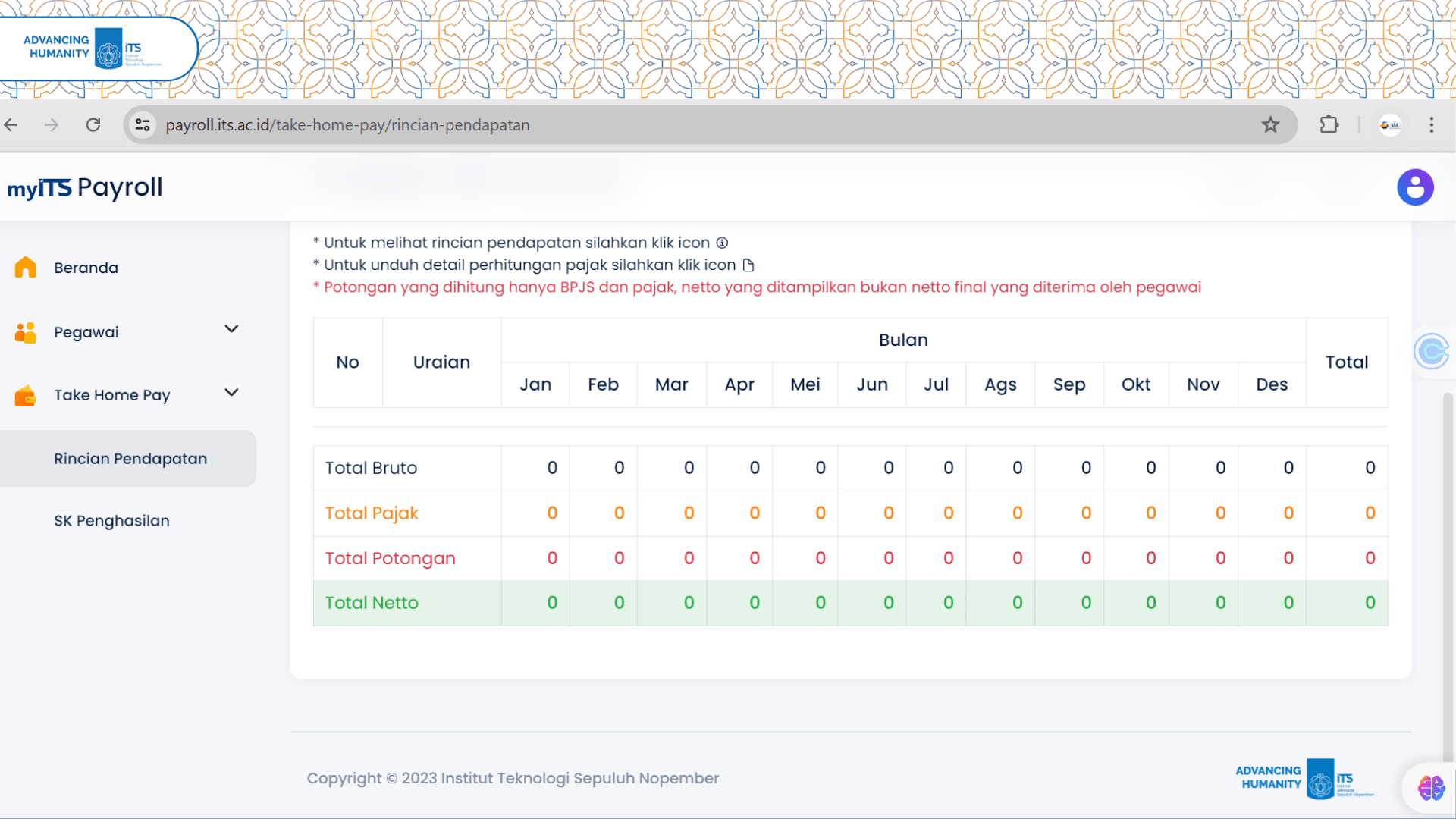
Tracking Pay Scale for Gender Equity
Institut Teknologi Sepuluh Nopember (ITS) upholds gender equity and ensures there is no injustice in employment management. ITS is committed to ensuring that all employees are compensated equitably, without any gender bias. This commitment extends to all aspects of salary, benefits, and bonuses.
Regulation of ITS Rector Number 25, 2021 about the employee management and Regulation of ITS Rector Number 8, 2024 about pay scale table is used as the basis of measurement and tracking for pay scale for gender equity. These regulations are essential to reflect that salary, benefits, or bonuses, at ITS is paid based on position, qualification, periode of work, and individual performance regardless of gender, religion, tribe, race, ethnicity, or any other protected characteristic.
Further, regular collections of employee earnings are collected through myITSPayroll system as can be seen below. ITS implements and maintains myITSPayroll application to streamline salary management and ensure transparency. This finance system is applied to all staff regardless of gender and is used as a financial tracking system. Roadmap for Bureaucratic Reform at Institut Teknologi Sepuluh Nopember 2021-2025 also ensures that:
“myITSPayroll application is one solution to simplify the management of salaries, deductions, and other work compensations, as a form of transparency and accountability in financial administration management for lecturers and staff at ITS.” (Chapter 3, Article D, Point 3)

Employment Appeal Process
ITS with its “Advancing Humanity” motto promotes an equitable work environment and addresses any discrimination and violation in human rights and or pay. If issues related to the employment rights arise, each employee has the right to appeal including but not limited to issues related to pay, overtime, benefits, promotions, abuse of authority and other disciplinary actions.
ITS Service Desk system provides a window for all employees to appeal, fill a complaint, and or a demand. As an example, during the regular employee appraisal period, the Official Letter regarding Performance Evaluation Number T/6838/IT2.III/TU.00.08/2021 stated that
“For any questions/appeal/feedback, please submit them through servicedesk.its.ac.id by stating the unit of contact for the appeal process (Directorate of Human Resources and Organization); Ticket Category for Performance Appraisal Evaluation; and the appeal process should include Name, Employee ID, Work Unit, and Screenshot of the performance achievement that wants to be appealed.”Futher, Official Letter regarding Employee Performance Evaluation Number 10433/IT2.III/B/TU.00.09/2023 through the table below justify a detailed evaluation process, including validation and appeal activities.
Specific to Employee appeal of overtime pay, ITS also provides an integrated system called E-lembur within myITS Portal for the employee where they can appeal for overtime payment, after the basic salary has been transferred, thus rights for additional payment beside the basic salary. Based on the process, a work assignment letter signed by the unit head, complete with fingerprint attendance data, and a detailed breakdown of overtime hours approved by the unit head should be submitted. Further, this procedure is stipulated in Standard Cost of Institut Teknologi Sepuluh November 2023 which states
Overtime entry must be done through the “e-lembur” application in MyITS.
The finance bureau will process overtime payments and supporting documents, taking the budget from each unit, including central units, faculties, and departments.(Section I. A point 2)
ITS also provides a Whistle Blowing System (WBS) to report an act indicating a violation that occurred within the ITS environment. This platform is used for those who possess information and wish to report suspected legal violations occurring within the ITS environment, including those related to human rights and / pay which is part of the Abuse of Authority or Extortion or Gratification. This ensures that employees have a safe platform to report broader concerns about unfair practices.
For issue related to Sexual Violance, ITS academic community, including students, lecturers, staff, and the community around ITS may report or appeal for any sexual violence through PPKS ITS which is a short form of Task Force for Preventing and Handling Sexual Violence ITS. ITS community may report based on the PPKS procedures below:
- The process begins with the submission of a report form, email, or Instagram DM to the ITS PPKS.
- The PPKS, upon receiving the report, will conduct a closed examination of the victim, the perpetrator, and/or the reporter. During the examination, the university leadership may temporarily suspend the educational rights of the reported party who holds the status of an educator, education personnel, or campus member.
- The next process involves a statement of conclusion and evidence regarding the existence or non-existence of the reported case.
- The implementation and supervision process will be carried out through a rector’s decree. Forms of victim assistance will be carried out with the victim’s consent and may include counseling, medical treatment, physical therapy, and social and spiritual guidance.
- In addition to administrative sanctions based on the rector’s decree, perpetrators proven to have committed sexual violence will be required to participate in mandatory counseling and learning programs, governance strengthening, and community culture strengthening.
The inclusion of PPKS (Task Force for Preventing and Handling Sexual Violence) ensures that individuals within the ITS community can report or appeal cases related to sexual violence. The detailed reporting process ensures a thorough investigation and support for victims, promoting a fair and safe environment.
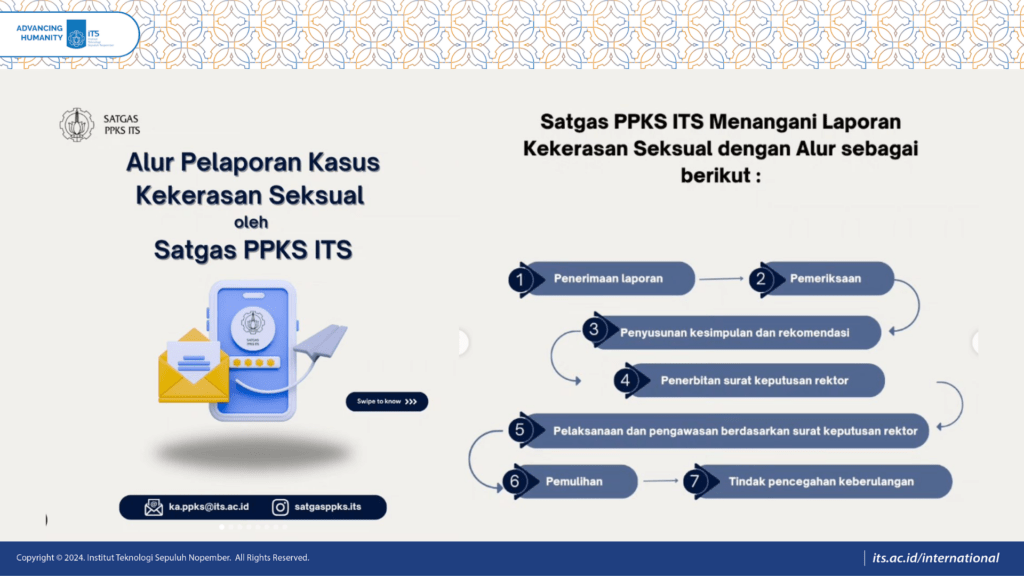
ITS Worker Union Activities through Koperasi Pegawai Republik Indonesia (KPRI)-ITS
Institut Teknologi Sepuluh Nopember (ITS) is committed to upholding the labor rights of all its employees, including the fundamental freedoms of association, assembly, expression, and collective bargaining. KPRI-ITS, an employee organization founded on September 17, 1981, and legally constituted under Entity Number 5089/BH/11/81, aims to:
- Increasing the knowledge of management and members through cooperative education, financial investment, and entrepreneurship.
- Developing new and sustainable businesses in the real sector to improve the welfare of members.
- Empowering the economic capacity of members by connecting/promoting member-owned businesses, including providing business capital loans.
- Utilizing continuous technological developments in the cooperative’s operational and service businesses.
- Providing optimal financial solutions for members, in the form of savings, loans, financing, and capital.
- Contributing to the social and economic development of the ITS community.

KPRI-ITS’s membership is open to all ITS employees, regardless of gender or nationality, ensuring equal treatment. The presence of women staff inside KPRI-ITS implies that there is no gender gap. International staff can join the cooperative by submitting proof of employment without the need for international documentation, highlighting inclusivity. KPRI-ITS implements various services, such as savings and loans for ITS employees, as well as outstanding programs, such as the established K-1 Mart, e-store services, and business with partners, to promote welfare and satisfy the demands of ITS workers.In 2023, KPRI ITS opened recruitment for candidates of KPRI ITS Chairman 2024-2026 period. Based on the KPRI ITS Circular Letter 2023, the criteria for members of the cooperative to apply for the position of cooperative chairperson are as follows:
- Must have been a member of KPRI-ITS for at least 3 years and/or have previously served as a member of the Supervisory Body of the Cooperative (BPK), the Working Body of the Member Meeting (BPRA), or as an administrator.
- The candidate must be a permanent employee of ITS (both civil servants and non-civil servants).
- Must have a commitment to advance KPRI-ITS.
- Must sign an Integrity Pact.
- Must fill out and submit a willingness form to become a candidate for chairperson.
- Must submit a vision, mission, and work program for the next 3 years.
- Must be a maximum of 55 years old at the time of application.
- The candidate for KPRI-ITS chairperson must not be a member of the 2023 Formation Team.
The criteria promote equal opportunities for all members, regardless of gender, fostering an inclusive environment. By emphasizing the importance of commitment to the cooperative’s mission, these criteria align with the goal of advancing sustainable economic growth and decent work for all, as outlined in SDG 8. This approach creates a culture where all employees, including women and marginalized groups, feel empowered to contribute to the organization’s success. Furthermore, by allowing members from diverse backgrounds—especially those with experience in supervisory roles—to apply for leadership positions, the criteria cultivate a rich pool of diverse leaders.
ITS Launches University Leadership Development Center to Empower Future Leaders
Institut Teknologi Sepuluh Nopember (ITS) has taken a significant step in recognizing labor rights and enhancing its workforce’s capabilities with the inauguration of the 2023 Leadership School Building, which serves as the University Leadership Development Center (ULDC). Officially opened by ITS Rector, Prof. Dr. Ir. Mochamad Ashari, this facility is aimed at improving employee competence, including for women and international staff. The ULDC, driven by ITS’ Directorate of Human Resources and Organization (SDMO), integrates various development programs to promote organizational performance and foster leadership across all areas of expertise, demonstrating ITS’ commitment to supporting employees’ professional growth and labor rights.The ULDC is structured into three main divisions: Leadership & Managerial Development, Talent Management, and Culture Transformation. These divisions provide a platform for employees to develop leadership skills and inspire them to reach their full potential. With 51 participants already selected for leadership training, the program emphasizes equal opportunities for all staff, aligning with labor rights principles like freedom of association and collective bargaining. This commitment to professional development supports ITS’ goal of creating a more adaptable, innovative, and competitive workforce, ensuring that all employees, regardless of gender or background, receive fair treatment and opportunities for growth.During the inauguration, Rector Ashari and other senior leaders reinforced the importance of providing optimal support, including training, facilities, and funding, to ensure that staff can thrive in their roles. The event highlighted ITS’ dedication to labor rights, as echoed by the Chair of the Board of Trustees, Prof. Dr. Ir. Muhammad Nuh, and government officials, who emphasized the need for a globally competitive, adaptable workforce. The ULDC initiative represents a strategic approach by ITS to not only foster leadership but also to uphold and promote labor rights within the institution
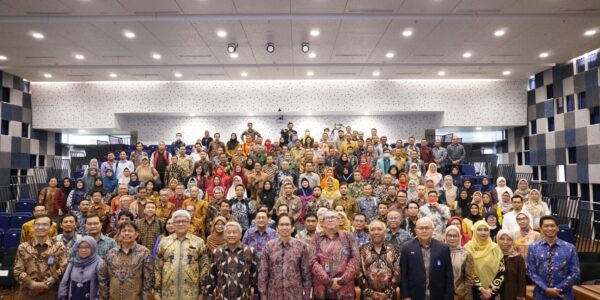
SDG 8 IN NUMBERS
20,851
Number of Students
6,700
Number of Students with Work Placements for More Than a Month
4,489
Number of Employees
4,489
Number of Employees on Contracts of Over 24 months
